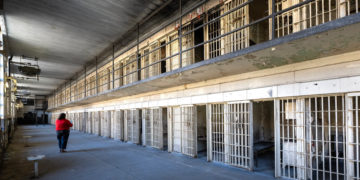Truman Capote once described the Kansas State Penitentiary in Lansing, Kan., as a “turreted black-and-white palace” with “a dark two-storied building shaped like a coffin,” where prisoners were held on death row, awaiting their execution.
Now, tourists will be able to get a glimpse for themselves of the fortresslike sandstone prison, where Capote interviewed Dick Hickock and Perry Smith, two drifters who were convicted of murdering four members of the Clutter family on their farm in Holcomb, Kan., on Nov. 15, 1959.
Those gruesome murders formed the basis of “In Cold Blood,” the book that cemented Capote’s status as a literary celebrity and helped propel the enduring American fascination with the true crime genre.
Hoping to save the former penitentiary from demolition, the Lansing Historical Society recently reached an agreement with the Kansas Department of Corrections to open the former prison for tours, beginning on Friday. The historical society also plans to hold a car show at the prison on Sept. 28.
The historical society hopes the tours will attract visitors to Lansing, a city of about 11,000 residents, 25 miles northwest of Kansas City, Mo.
Debra Bates-Lamborn, president of the Lansing Historical Society, said that visitors would learn how prisoners were fed, how they were handcuffed and how the inmates who were deemed dangerous were segregated from other prisoners.
She said the society also hoped to acquire the prison gallows where Hickock and Smith were hanged on April 14, 1965, from the Kansas Historical Society and reassemble it for public viewing.
“We want to present that whole picture here,” Ms. Bates-Lamborn said. “We want to focus on the history of the prison and the people who made that history, and that would be both sides — your inmates and your correctional officers.”
The prison has a long history, dating to the 1860s, when it was built by prisoners who were held in wooden stockades. In the 1880s, prisoners worked in a coal mine there, fueling growth in an area that came to be known as the Town of Progress, according to the Kansas Department of Corrections.
Thousands of inmates were incarcerated there, and generations of Lansing residents worked in the prison as guards before it closed in 2020. Among those who were held on death row there were Hickock and Perry, after they were convicted of killing the Clutter family.
In November 1959, Capote stumbled on a short UPI article published in The New York Times about the murders and set out to write about them.
Accompanied by his friend Harper Lee, the author of “To Kill a Mockingbird,” he traveled to Kansas to investigate the crime. At the prison, he interviewed Hickock and Smith several times before the men were hanged, Ms. Bates-Lamborn said.
Capote turned the murders into “In Cold Blood,” published as a four-part series in The New Yorker in 1965 and as a book in 1966. The book has been widely credited with helping to establish the literary genre of the nonfiction novel.
It also helped to make a literary star of Capote, whose own life was later dissected in a biography by Gerald Clarke, movies starring Philip Seymour Hoffman and Toby Jones and a recent television series, “Feud: Capote vs. the Swans,” starring Tom Hollander.
The prison hosted other significant moments. In 1970, Johnny Cash and June Carter Cash performed for an enthusiastic crowd of inmates there, Ms. Bates-Lamborn said.
Kyle Deere, who was a deputy warden at the prison from 1988 to 2014, said he planned to lead some of the tours at the prison, where he said his grandfather, who was a guard, had been held hostage by prisoners during an escape in the 1930s.
Mr. Deere said he had also heard from former prisoners who were interested in leading tours of the prison, which was later renamed the Lansing Correctional Facility.
“It’s going to be a great experience for those that maybe have some history within the facility, whether they worked there, they had family members who worked there or whether they lived there,” Mr. Deere said. He added, “Everybody’s really excited about it, especially in the Lansing community.”
The post Prison Where Capote Interviewed Killers for ‘In Cold Blood’ Will Open to Tourists appeared first on New York Times.



















